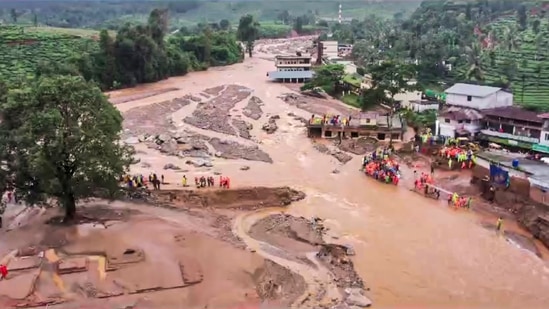The eco-sensitive areas along the Western Ghats are yet to be notified by the Centre, 13 years since the first such demarcation was recommended by a panel led by eminent ecologist Madhav Gadgil in 2011. Meanwhile, the protected area has shrunk from the original 75% (of the range) recommendation to 37% in the last draft notification on July 6, 2022.

Would doing so have prevented Tuesday’s tragedy? It emerges that the Gadgil panel recommended placing a site, which includes the area where the landslide occurred, in the top tier of ecological sensitive zones or areas.
The committee, which was set up by the Centre to assess the environmental sensitivity of the Western Ghats and the possible impacts of the climate crisis in the region, recommended that 75% of the 129,037 sq km area of the mountain range be declared ecologically sensitive because of the presence of dense forests, a large number of endemic species and unique geology. It also recommended placing Sulthan Bathery, Vayittiri, Manantavadi in Kerala’s Wayanad district in the ESZ (eco-sensitive zone; also called ESA or eco-sensitive area) 1 category, which refers to the highest ecological sensitivity.
Read more: PM Modi speaks to Kerala CM over Wayanad landslides, assures all possible help
It must be noted that ministry’s draft notification has considered the total area of Western Ghats to be 160,000 sq km.
The Gadgil panel’s suggestion was, however, met with resistance as several states deemed it too restrictive, prompting the assessment of the region by a second panel.
The second committee, headed by rocket scientist K Kasturirangan, in 2013 scaled down the overall ecologically sensitive area to 50%, but its recommendations too were never really followed. Four draft notifications have since been issued but no formal announcement has been made.
And the states involved have vehemently opposed any such protection.
“In order to protect the rich biodiversity of Western Ghats, this ministry has issued draft notification on Western Ghats Eco-Sensitive Area vide S.O. 3072 (E) on 06.07.2022 with an area of 56,825 square kilometre spreading over six States, namely, Goa, Gujarat, Karnataka, Kerala, Maharashtra and Tamil Nadu, based on the report submitted by the High Level Working Group (HLWG) Chaired by Dr Kasturirangan. The states have persistently asked for modification in the Eco-Sensitive Area (ESA), included in the aforesaid draft notification,” the Union environment ministry informed the Lok Sabha on July 22.
Read more: Wayanad landslides: Death toll climbs to 123; Kerala braces for more rain
Kerala and Karnataka were particularly opposed to declaring certain areas along the Western Ghats as ESZ, thereby, delaying protection to the region and allowing activities such as rock quarrying, mining and establishment of new industries to continue.

“In order to address the issues raised by the state governments, the ministry constituted a committee to re-examine the suggestions of the six states in a holistic manner, keeping in view the conservation aspects of the disaster prone pristine ecosystem, and the rights, privileges, needs and developmental aspirations of the region. The concerns of the states, including Kerala and Karnataka, are deliberated by the committee and based on the recommendations of the said committee, the draft notification is finalized,” minister of state for environment Kirti Vardhan Singh said July 22, explaining the process.
In the latest iteration of the notification the area to be notified reduced to 37% of the Western Ghats. This draft was issued on October 3, 2018, but the ministry, in view of the Covid-10 pandemic, on June 16 last year extended its validity till December 31, 2021.
Read more: Kerala: IMD issues red alert for landslide-hit Wayanad, train services disrupted amid heavy rains
The 2018 document recommended a complete ban on mining, quarrying and sand mining; a phase out of all existing mines within five years from the date of the final notification being issued or the expiry of the existing mining lease, whichever is earlier; a ban on new thermal power projects or expansion of existing plants; and a ban on new or expansion of polluting industries as specified by the Central Pollution Control Board or State Pollution Control Board.
None of these was followed.


